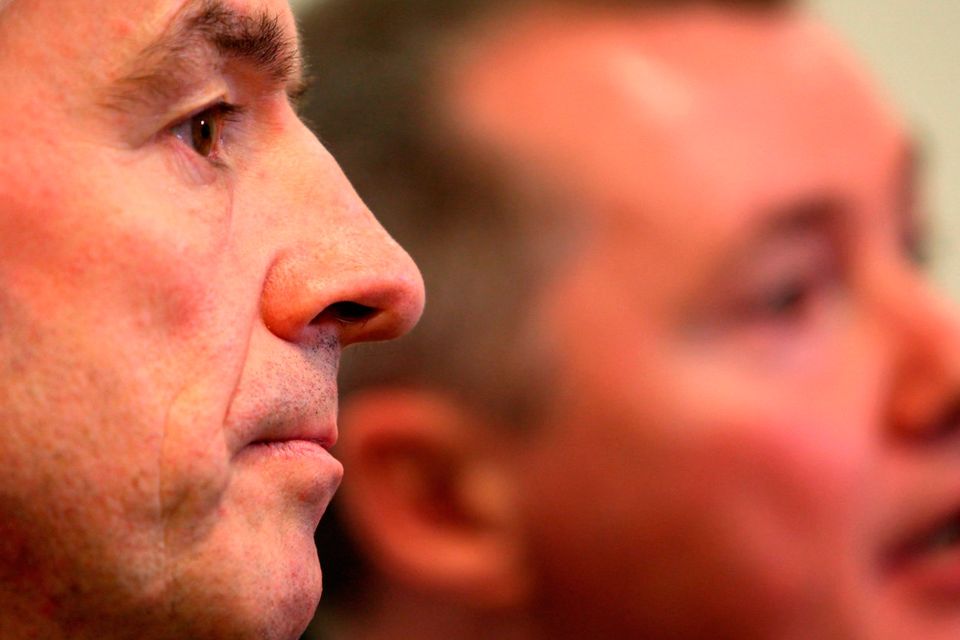Trading places: O'Leary and walsh fly different paths with unions
When it comes to industrial relations, recent events suggest the tables have turned for Michael O'Leary and Willie Walsh, writes Fearghal O'Connor
Michael O’Leary, chief executive officer of Ryanair, left, listens as Willie Walsh, chief executive officer of IAG, speaks at a news conference
So determined was Michael O'Leary not to recognise trade unions at his airline that he found himself in the baggage hall at Dublin Airport loading bags. It was February 1998 and a group of Ryanair baggage handlers had halted work in their bid to have their union recognised by the company.
Nearby, a young Willie Walsh was still months away from taking his first management job as boss of Aer Lingus's Spanish subsidiary, Futura. Walsh was still flying Aer Lingus aircraft in and out of Dublin Airport so therefore had a front-row seat to watch the Ryanair baggage handler strike unfold in a then all too predictable way for the national airline. Aer Lingus, then in a permanent state of warfare with its unions, ground to a halt, while Ryanair, cajoled by an uncompromising O'Leary, kept on flying right through its own strike.
The following month Ryanair lodged a massive $2bn order with Boeing for 45 737-800s which would become the backbone of its conquest of Europe. Aer Lingus in the meantime was heading for years of chaos. But Walsh had learned a valuable lesson.
Now, 20 years later the two aviation executives find the tables turned with regard to their relationships with trade unions.
Walsh may face industrial relations challenges at IAG, but new correspondence obtained by this newspaper shows the extent to which Aer Lingus - one of IAG's subsidiary carriers - has a very different relationship with its unions, one in which it refuses to be dictated to.
For O'Leary - on the other hand - hell has finally frozen over and he is in it. Ryanair is now feeling the full impact of his decision to finally recognise trade unions.
Last week the airline's share price was pummelled when it issued a profit warning, citing higher costs and weaker fares due to recent strikes. It must be noted that a profit warning for Ryanair means it has merely lowered its guidance for profits for the full year to a new range of €1.1bn to €1.2bn. The announcement the following day that September traffic had risen 6pc only added to the feeling that one airline executive's crisis is another executive's bonanza.
Barclays research published last week said that the share price reaction "reminds us that we are in uncharted territory for the group". Risks of more strikes remain, Barclays warned, although it concluded that "the model has been softened, not broken" and that Ryanair's cost base and productivity will ensure it remains "a structural winner".
Nevertheless, aviation and industrial relations experts the Sunday Independent spoke to believe that Ryanair's response to staff unrest has been far from sure footed and that this does present some challenges to the model into the future.
"Ryanair adopted something that was already going out of date," said one long time close observer of both companies. "In 1998, as a young man, O'Leary saw off the unions. It's an argument that is now 20 years old, but back then he appeared to end it forever at the company."
But now O'Leary seems to be adopting the Aer Lingus model and Aer Lingus appears quietly to be adopting the Ryanair "our way or the highway" model, said the source.
"So O'Leary makes this huge leap and does what nobody expected he would ever do and recognises the unions and what do they do?" says one aviation expert. "They kick him in the proverbials. They go on strike or threaten to go on strike all over the place. What was the point in recognising them so? Meanwhile at Aer Lingus there are no strikes, but there is plenty of tough talking behind the scenes."
How the tables have turned. Ryanair is facing potential disruption and possible strikes right across the continent over seemingly innocuous issues. But at Aer Lingus, since IAG took over, management has taken a low key but very firm approach to its trade unions.
Indeed, correspondence last week from the airline to Siptu, seen by this newspaper, comes with the type of uncompromising tone that O'Leary in his heyday would have been proud of.
The letter from Sean Murphy, Aer Lingus director of employee relations and change, was written in response to a trade union decision not to attend a previously agreed meeting with Aer Lingus' chief operating officer, Mike Rutter.
"It is absolutely astonishing that yet again elected representatives have chosen not to make themselves available to meet with the senior management team of the company they work for, who pays their salaries and provides them with the facilities to conduct the business of a staff representative," wrote Murphy.
"Given that staff representatives have refused again to meet senior management, we will deem their non-attendance as confirmation that they do not wish to continue representing colleagues.
"Therefore we would ask that Siptu and the representatives reflect on their position over the weekend. If the position remains the same, with effect from close of business Monday, we will withdraw the facilities provided to the representatives until such time as they commit to professionally discharging their responsibilities as representatives, or are replaced."
The letter was the latest in a series of communications by the airline with Siptu prompted by a row over the reorganisation of the red cap function - red caps coordinate and handle individual flights on the airport ramp - at Dublin Airport.
Last week this newspaper reported that Aer Lingus had claimed new hand-held devices designed to streamline its operations on the ramp had been interfered with as a row over redundancies erupted.
Aer Lingus is in a no-nonsense mood when it comes to industrial relations. Contacted by this newspaper for comment on the red cap row, the airline was not for backing down. It said that it had created over 1,000 jobs in recent times with hundreds more to come over the next 18 months and had been in discussions with Siptu since 2016 about modernising work practices.
It insisted the changes would not mean any redundancies or outsourcing and that it was "simply a question of moving with the times and introducing industry-standard work-practices at Dublin. We are currently operating outmoded working practices 'below wing' [various ramp operations] and this makes our model very uncompetitive when compared across the industry."
The airline, said the statement, already has in place the collective agreements with its staff and "commitments from the union leadership" to enable it deliver the required efficiencies. "Aer Lingus is the only airline/service provider using the older working model, the whole industry has moved on. It is reasonable that people will continue on-the-job learning in an industry such as aviation where new work practices are developed and implemented so that airlines can continue to offer competitive fares."
Close observers at Dublin Airport expect only one winner from the row: Aer Lingus management. That has been the pattern ever since Walsh and IAG took over. Mike Rutter was sent to Dublin to help implement these changes. The tough-talking Newcastle native had previously led an overhaul of Flybe's operation that a young O'Leary would have been proud of.
Rutter has brought the same approach at Aer Lingus and its unions have barely whimpered, despite the constant change that has been under way since the takeover. Taking on and beating the unions has become a hallmark of the Willie Walsh era at IAG. In Spain it was predicted that the trade unions there would make the Dubliner's life a misery. He told them Iberia would "restructure or die". They restructured.
At British Airways he has won virtually every battle yet with the unions, famously drafting in a fleet of Qatar Airways planes to keep BA flying during last year's cabin crew strike.
Analysts point out that when it comes to industrial relations, Walsh perhaps has it easier than O'Leary because of the structure of IAG, with subsidiary airlines based mainly in just three countries. Also, industrial relations in IAG is run individually by each airline in the group, dispersing the whole process and insulating Walsh.
"There's no grandstanding or caricaturing because a lot of the managers involved are anonymous and nobody outside of their own organisation knows who they are," said one industrial relations expert.
"That keeps Willie Walsh well away from it and he doesn't find himself at the pointy end of various campaigns or issues. Whereas in the Ryanair situation you have a scattering of unions all across Europe who are all trying to train their guns collectively on one management team and one CEO. That's a different, particularly challenging, dynamic for the Ryanair guys."
For Ryanair, the transition from a non-unionised to a unionised set of relationships was always going to be very difficult, and will continue to be, into 2019, he said: "But it will have to get to a point where it is normalised and things are done in a more rational way and Ryanair needs to plot its way through that."
Former Aer Lingus chairman and aviation entrepreneur Colm Barrington believes that the advent of trade unionism in Ryanair - particularly among pilots and cabin crew - was inevitable.
"During my time in Aer Lingus we worked with the unions as best we could. You had to work with them rather than fight them. The airline was losing money and we worked with them not to reduce pay as such but to try and get rid of some of the inflexibilities that had built up over the years. I think that message got through and people realised that they had to work together positively rather than negatively and it worked quite well in Aer Lingus."
At pre-IAG Aer Lingus Barrington saw just how powerful a competitor Ryanair was and believes that despite its union issues it remains extremely strong and very efficient.
"Ok, their cost of operation is going to go up but Ryanair still has by far the lowest cost of almost any airline, certainly in Europe. So I think they can take a higher labour cost and still be very flexible. The big cost for them is the cancellations and the disruption to their operations while this thing is getting sorted out.
"I would have thought that their best bet is to sort it out as quickly as possible and to get on with life and not fight everything. But that is not necessarily in their gene pool."
Barrington believes that a bigger issue than growing labour costs for Ryanair could be the inflexibility that trade union recognition may introduce into a business model that has always been built on the ability to react quickly to events.
"Certainly that could damage it and that's why I think they should get on with working things out in as flexible a way as possible, even if they have to pay a bit more. But the great thing about Ryanair is that their operation is big enough that flexibility is built in."
Another close industry observer agrees but says Ryanair is now going through what Aer Lingus went through 20 years ago. He is bullish about Ryanair's prospects to ride out the storm but believes O'Leary and his management team have already shown a serious lack of understanding of how to deal with trade unions in how they handled the trade union recognition issue.
"Instead of making an announcement around it they probably should have engaged initially around the prospect of recognising unions and extracted a price for it. Part of that price could have been industrial peace. Instead, what they have now is the reverse."
Another aviation source with knowledge of Ryanair's internal structures agrees that union recognition was given away too cheaply.
"At the time they felt under enormous pressure and they didn't want to blow up their Christmas bookings so they decided to go for it. But there is an argument to be made about the consequences of that decision being far more profound than maybe they accepted at the time.
"It's fine to accept recognition of unions, but you have to embrace what that actually means and that can be very uncomfortable. There are things from the past they can no longer do or say if they don't want to aggravate an already sensitive situation," said the industry analyst.
But there is a wider backdrop to what is going on at Ryanair, IAG and every other airline across Europe. Ryanair's share price has fallen 30pc since June and many analysts have linked that directly to its ongoing industrial relations issues. But the aviation analyst points out that both EasyJet and Wizz Air are also down over 30pc in the same period.
"The reason they are all down is simply because oil is at $85 and there is too much capacity in the marketplace. Every time in history when you have had high oil prices and too much capacity, airline share prices get cleaved. That is what is going on here. The union issues in Ryanair are difficult and they are not helping the share price but they are not the full answer to why it has gone down so much."
In the past, Ryanair has reacted to a crisis in the airline industry to use its position as the lowest cost carrier in the market to take fares down as low as they possibly can to make sure it keeps its load factors up. Unlike most other airlines it can continue to be profitable at very low fares.
"I think they [Ryanair] are going to cut loose now and flame grill the market with low fares," said the analyst. "Forward bookings have been undermined by the labour issues but they are going to dog their way through this. Unions or groups of employees who think Ryanair is not willing to pull aircraft out of bases where there is trouble are being very naive. That's the way Ryanair works."
Of course, if that happens, Willie Walsh - and every other airline executive - may also find that a wounded beast has the sharpest bite.
IAG AND RYANAIR
Ryanair
Chief executive: Michael O’Leary
Market capitalisation: €13.4bn
Employees: 14,500
September 2018 passenger numbers: 13.1 million (up 11pc)
Turnover: €7.2bn
Profit (ebitda): €2.2bn
Return on invested capital: 16.6pc
IAG
Chief executive: Willie Walsh
Market capitalisation: £13.9bn (€15.8bn)
Employees: 63,422
September 2018 passenger numbers: 10.6 million (up 7.1pc)
Turnover: £23.2bn (€26.3bn)
Profit (ebitda): £4.4bn (€4.9bn)
Return on invested capital: 14.8pc
Join the Irish Independent WhatsApp channel
Stay up to date with all the latest news















